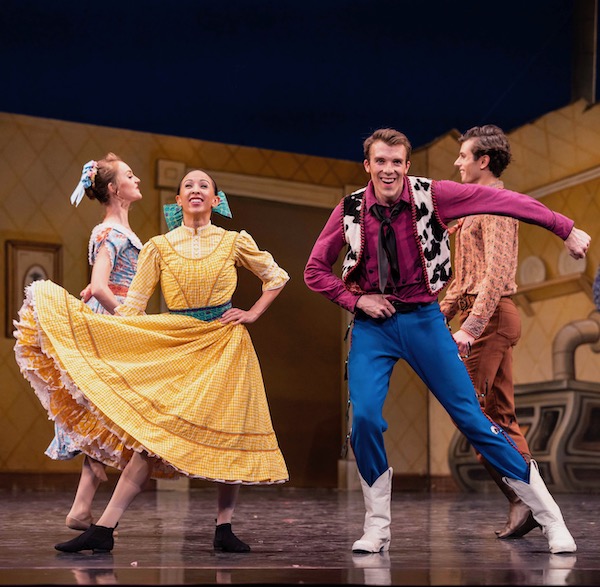Ballet West’s program of short works delivers with “Rodeo” and Balanchine/Bach
Ballet West’s most recent program forgoes the massive, three-act ballets that crowd the rest of its current season for three shorter pieces from the canon. While many audience members like a big, bold melodrama, mixed lineups such as this offer less grand and more specific explorations.
At its best, the show, seen at its closing performance Saturday night, presented some of the unique strengths of Ballet West in ways that big productions may do less frequently.
Agnes de Mille’s Rodeo—with a legendary score by Aaron Copland—provided the night’s grand finale and was one of the most crowd-pleasing productions seen at BW in recent seasons. Long hailed as an “American classic,” what struck most about this performance of the 1942 ballet on its 80th anniversary was its engagement with a grandiose, Hollywood-ized mythos. Rodeo lives in the American fantasies of Chaplin, Keaton and Ford, exhibiting an enlivening engagement with the visual language of silent film slapstick. The piece was a riotous good time, full of tap dancing, square dancing, vivid Western sets and a set of pastel gunslinger outfits that would feel better at home at a cowboy-themed ball at The Suntrapp than they would in an actual hoedown.
No performer honored the piece’s physical comedy better than Jenna Rae Herrera as the lead Cowgirl. On stage, she possesses all the wit and agility of Chaplin at his finest, playing up her
character’s cantankerous nature. She often elicited belly laughs from the audience, whether she was toeing up with the (much taller than her) cowboys or throwing multiple, exaggerated tantrums on the stage floor.
Tyler Gum won the crowd over with an audacious tap-dancing performance in the middle of the famed Hoedown scene, but Ballet West’s Rodeo belonged to Herrera—in her movements, the proto-postmodern blend of classical and modern, humor and drama, and high and low art feels not only natural, but inevitable.
The program’s opening piece, George Balanchine’s Concerto Barocco, is a setting of Bach’s Concerto for Two Violins, which may well have been the standout performance of the night. Forgoing any overt narrative or emotional arc, the piece instead explored a visual representation of the German master’s intricate counterpoint As the arpeggios, fugues and sequences flew, the dancers moved about in fluid synchronization that matched the music’s perfect balances.
The second-movement pas de deux between Olivia Gusti and Brian Waldrep stood out for its romantic scope, but the rigidity and poise attained by the eight-person ensemble shone most. Classical musicians revere Bach for his ability to turn mathematical precision into otherworldly beauty, and here Ballet West achieved a similar feat. The identically clad dancers found transcendence in pattern as they bent and swayed in direct concert with the shifting rhythms of the concerto.
In between these two highlights came Jiří Kylián’s Return to a Strange Land (1975), which was less inspired. Dedicated to Kylián’s then–recently deceased mentor, John Cranko, the piece comprises four stoic movements of duo and trio performances set to a series of middling Janáček piano works.
Return searches for an emotional power that it never quite reaches. The dancers move in long, languid acrobatics, each section closing in a jaw-dropping pose of held muscularity. Buoyed by a sparse set of colored lighting and heavily metaphoric orange leaves littering the stage, the piece’s placidness often felt at odds with the angular modernism of the music.
This incongruence also seemed to plague the performers, who rank among BW’s finest and most technical dancers but seemed stuck between the piece’s physically demands and its supposed tenor of longing grief. Emotional juxtaposition can be profound, but here it felt simply confused.
Ballet West’s The Nutcracker runs from December 2-24. balletwest.org
